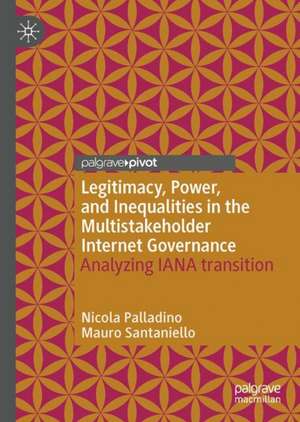Legitimacy, Power, and Inequalities in the Multistakeholder Internet Governance: Analyzing IANA Transition: Information Technology and Global Governance
Autor Nicola Palladino, Mauro Santanielloen Limba Engleză Hardback – 7 noi 2020
Preț: 419.06 lei
Nou
Puncte Express: 629
Preț estimativ în valută:
80.19€ • 85.75$ • 66.86£
80.19€ • 85.75$ • 66.86£
Carte tipărită la comandă
Livrare economică 17 aprilie-01 mai
Preluare comenzi: 021 569.72.76
Specificații
ISBN-13: 9783030561307
ISBN-10: 3030561305
Pagini: 156
Ilustrații: XVII, 156 p. 3 illus., 2 illus. in color.
Dimensiuni: 148 x 210 mm
Greutate: 0.36 kg
Ediția:1st ed. 2021
Editura: Springer International Publishing
Colecția Palgrave Macmillan
Seria Information Technology and Global Governance
Locul publicării:Cham, Switzerland
ISBN-10: 3030561305
Pagini: 156
Ilustrații: XVII, 156 p. 3 illus., 2 illus. in color.
Dimensiuni: 148 x 210 mm
Greutate: 0.36 kg
Ediția:1st ed. 2021
Editura: Springer International Publishing
Colecția Palgrave Macmillan
Seria Information Technology and Global Governance
Locul publicării:Cham, Switzerland
Cuprins
Chapter 1. Introduction - The IANA Transition and Internet Multistakeholder Governance.- Chapter 2. Foundations, pitfalls, and assessment of multistakeholder governance.- Chapter 3. IANA functions, ICANN and the DNS war.- Chapter 4. The Institutional Design of the IANA Transition process.- Chapter 5. The Input Legitimacy of the IANA Transition Process.- Chapter 6. The Throughput Legitimacy of the IANA Transition process.- Chapter 7. The Output Legitimacy of the IANA Transition process.- Chapter 8. Conclusion: The misleading rhetoric of multistakeholderism.
Notă biografică
Nicola Palladino is a research fellow at the Department of Political and Social Studies, University of Salerno, Italy, where he works at the Internet & Communication Policy Center. He has taken part in several national and international research projects on Internet Governance, Internet Policy and Digital Constitutionalism processes.
Mauro Santaniello is a researcher at the Department of Political and Social Studies, University of Salerno, Italy, where he teaches Internet Governance and Digital Policy. He is a co-founder and vice director of the Internet & Communication Policy Center. He has led several research groups on Internet Governance and Policy.
Mauro Santaniello is a researcher at the Department of Political and Social Studies, University of Salerno, Italy, where he teaches Internet Governance and Digital Policy. He is a co-founder and vice director of the Internet & Communication Policy Center. He has led several research groups on Internet Governance and Policy.
Textul de pe ultima copertă
This book aims to develop a critical understanding of multistakeholder governance in Internet Governance through an in-depth analysis of the Internet Assigned Numbers Authority (IANA) transition, the process through which the U.S. Government transferred its traditional oversight role over the Domain Name System to the global Internet community. In the last few decades, multistakeholderism has become the dominant discourse in the Internet Governance field, mainly because of its promise to provide democratic legitimacy for transnational policymaking, although empirical research has highlighted disappointing performances of multistakeholder arrangements. This book contributes to the debate on multistakeholder governance by analyzing the IANA Transition process's normative legitimacy, broken down in the dimensions of input legitimacy (inclusiveness, balanced representation, and representativeness), throughput legitimacy (procedural and discursive quality), and output legitimacy (outcome and institutional effectiveness). Findings warn about the risk that multistakeholderism could result in a misleading rhetoric legitimizing existing power asymmetries.
Nicola Palladino is a research fellow at the Department of Political and Social Studies, University of Salerno, Italy, where he works at the Internet & Communication Policy Center.
Mauro Santaniello is a researcher at the Department of Political and Social Studies, University of Salerno, Italy, where he teaches Internet Governance and Digital Policy.
Nicola Palladino is a research fellow at the Department of Political and Social Studies, University of Salerno, Italy, where he works at the Internet & Communication Policy Center.
Mauro Santaniello is a researcher at the Department of Political and Social Studies, University of Salerno, Italy, where he teaches Internet Governance and Digital Policy.
Caracteristici
Performs an in-depth, empirical analysis of the IANA transition process, taking into account the process design, actors involved, the deliberative and discursive dimensions of the process, and the outputs produced Assesses the legitimacy of the IANA transition process on the basis of a set of criteria well-recognized by scholars of transnational governance Places the IANA transition in a broader critical reflection about the development of multistakeholder governance within and beyond the Internet Governance ecosystem













